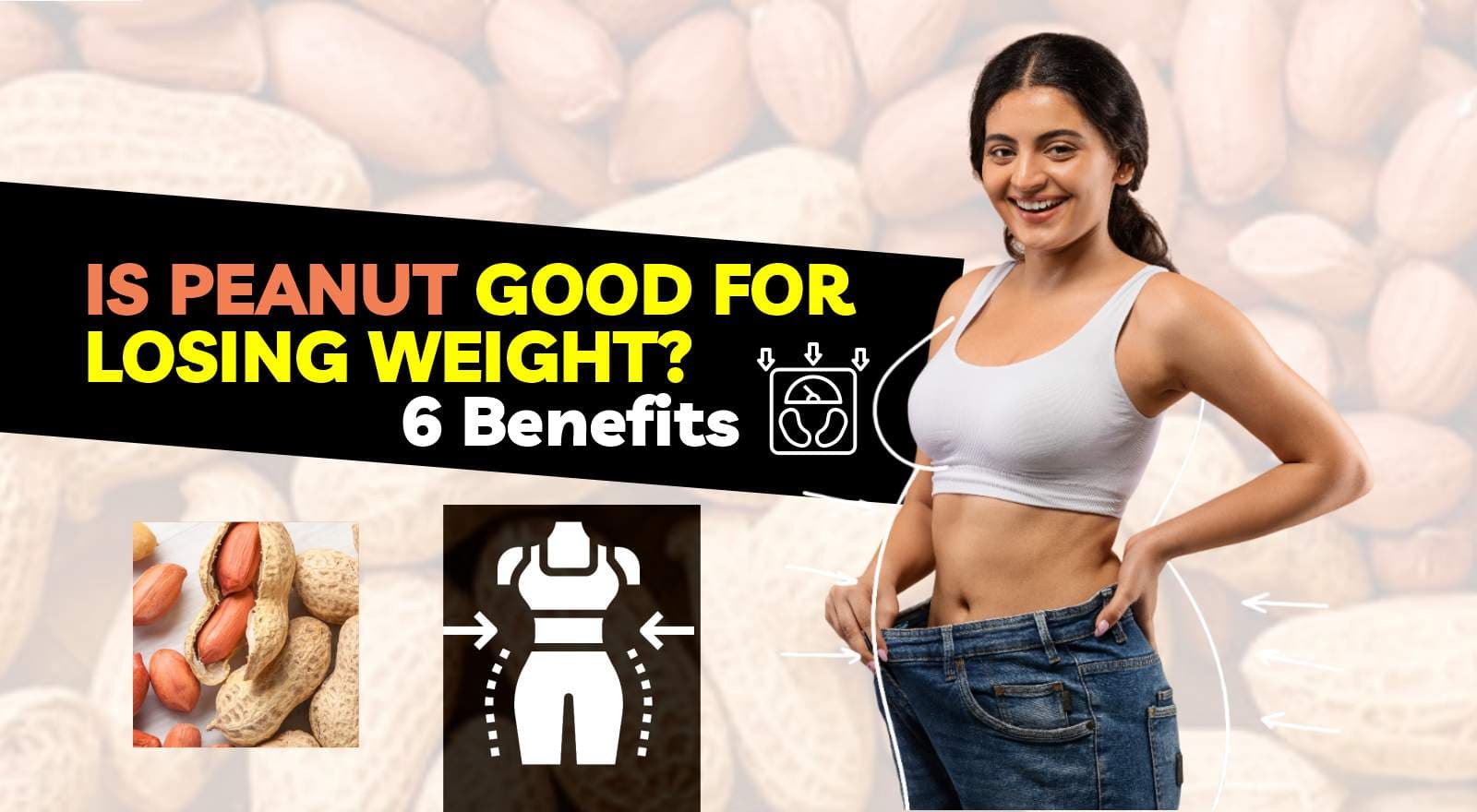Are you trying to lose weight but worried about whether peanuts will help or hinder your progress? Many people assume that peanuts are too high in fat to be part of a weight loss diet, but is that really true? The truth is that nutritious peanuts high in protein, healthy fats, and fibre can actually support weight loss when eaten in the right amounts. The high protein in peanuts increases calorie burning through the thermic effect of food (TEF), where the body uses energy to digest and absorb nutrients. From keeping you full for longer to boosting metabolism, these small but mighty legumes have proven benefits for losing weight and belly fat healthily.
But how much peanut consumption is too much? And what’s the best way to include peanuts in your weight loss diet? Let’s explore six nutritional benefits of peanuts for weight loss, along with the recommended daily intake to help you make the most of this nutrient-dense food!
Table Of Contents
1. Is Peanut Good For Losing Weight? 6 Benefits
2. Are Peanuts Good For Losing Belly Fat?
3. How Many Peanuts Should I Eat To Lose Weight?
4. The Final Say
5. FAQs
6. References
Is Peanut Good For Losing Weight? 6 Benefits

Can you eat peanuts and still lose weight? It's a surprising YES! Crunchy, satisfying snack peanuts offer a unique combination of nutrients that can actually support your weight loss goals.
Let's explore six key benefits of peanuts that explain how they can fit into a healthy weight management plan:
1. Prevents Overeating & Unhealthy Snacking
Many people struggle with frequent snacking and overeating, which adds unnecessary calories and slows down weight loss. Peanuts are healthy foods for weight loss that help control this by providing a perfect balance of protein, dietary fibre, and healthy fats that naturally curb hunger. Since they take longer to digest, they keep you satisfied for a longer time and prevent cravings for unhealthy snacks like chips or sweets. Their rich nutrient profile makes them a great alternative to processed snacks, ensuring you consume fewer empty calories while still feeling full and energised.
Tip: To avoid overeating, stick to a small handful (about 28 grams) of unsalted, dry-roasted peanuts. You can also pair them with a fibre-rich fruit like an apple for added fullness and a balanced nutrient intake.
2. Promotes Satiety For A Long Time
Feeling hungry too soon after a meal can lead to unnecessary eating, making it harder to stay within a calorie deficit. Peanuts help maintain a prolonged satiety state by providing a high amount of protein, which takes longer to digest and keeps you full for extended hours. The healthy fats in peanuts also provide sustained energy, preventing excessive energy crashes that often lead to binge eating of unhealthy foods, making it easier to stick to your weight loss plan.
Tip: Include peanuts in meals to enhance satiety. Spread peanut butter on whole-grain toast, add peanuts to salads, or blend them into smoothies. Keep portion sizes in check to avoid excess calorie intake.
3. Allows Healthy Digestion Process
A well-functioning digestive tract is essential for weight management, and healthier food swaps, like peanuts, support digestion with their high-fibre portion. Dietary fibre promotes regular bowel movements, prevents constipation, and improves gut health by feeding beneficial bacteria. A healthy digestive system ensures better nutrient absorption and reduces bloating, making you feel heavier and sluggish. Peanuts contribute to better metabolism and overall weight loss efforts by keeping digestion smooth.
Tip: Eat raw or lightly roasted peanuts to preserve their fibre content and digestive benefits. Drink plenty of water all day, as fibre works best with proper hydration. Avoid heavily salted or flavoured peanuts that may cause bloating.
For relief from digestive discomfort, consider Digest 360 Tablets by ToneOp Care. This product offers 12 powerful enzymes, restores your digestive system's balance, and supports optimal gut health.
4. Improves Metabolism
A strong metabolism helps the body burn calories efficiently, and peanuts boost metabolic levels. Their protein content increases the thermic effect of food (TEF), meaning the body burns more excess calories digesting protein than fats or carbohydrates. Magnesium in peanuts also helps in energy production and muscle function, contributing to a higher metabolic rate. With an improved metabolism, the body processes calories more effectively, preventing excess fat storage.
Tip: Have a small portion of peanuts after a workout to aid muscle recovery and maintain energy levels. Try peanuts in pre-workout meals for sustained stamina. Avoid fried peanuts, as excess oil can slow down metabolism instead of boosting it.
5. Reduces Chronic Inflammation
Chronic inflammation can make weight loss difficult by slowing metabolism and increasing fat storage. Peanuts, like fat-burning foods, contain powerful antioxidants like resveratrol and vitamin E, which help reduce oxidative stress and fight inflammation. Their healthy monounsaturated and polyunsaturated fats further support anti-inflammatory responses, promoting overall well-being. Reducing inflammation helps in better metabolic function, improved energy levels, and easier weight loss.
Tip: To maximise anti-inflammatory benefits, have foods and drinks to reduce body heat, like plain, boiled, or raw peanuts. Avoid deep-fried or processed peanut products, as they contain unhealthy fats that cause inflammation. Pair peanuts with fresh fruits and whole grains for a balanced diet.
6. Balances Blood Sugar Levels
Stable blood sugar levels are important for weight control, as sudden spikes and crashes lead to overeating and cravings. Peanuts have a low glycemic index (GI), providing slow and steady energy without causing sugar spikes. Their combination of fibre, protein, and healthy fats helps regulate insulin response, making them an ideal food for blood sugar balance. This prevents sudden hunger pangs and keeps energy levels stable throughout the day.
Tip: Pair peanuts with complex carbohydrates like whole grains or vegetables to maintain steady blood sugar levels. Avoid sugar-coated or flavoured peanuts, as added sugars can cause spikes and counteract their benefits.
ToneOp Fit's Balanced Diet Weight Loss Plan emphasises nutrient-rich foods like fruits, vegetables, nuts, and seeds for sustainable weight loss. The plan features a personalised diet tailored to your needs, ensuring you receive balanced nutrition without additional supplements. Access to over 40,000 healthy recipes allows you to enjoy many delicious and nutritious meals supporting your weight loss goals.
Also Read: 10 Calorie-Heavy Indian Foods To Avoid For Weight Loss
Are Peanuts Good For Losing Belly Fat?
Indeed! Peanuts, despite being high in calories, can actually be a good addition to your diet if you're trying to lose belly fat. Here's why:
- Protein helps you feel full: Peanuts have lots of protein, so you won't feel hungry as quickly, and you'll eat less overall.
- Healthy fats are good for you: The healthy fats in peanuts can aid in burning belly fat by promoting the conversion of white fat cells into beige fat cells, which have a higher capacity for energy expenditure and fat oxidation.
- Fibre keeps you going: Peanuts have fibre, which helps you digest food and feel full. This also helps keep your blood sugar steady so you don't get sudden cravings.
- Blood sugar spikes? Bye-bye: Peanuts, with their low glycemic index and high magnesium content, help regulate blood sugar levels and improve insulin sensitivity, preventing spikes that can lead to weight gain and increased belly fat.
Also Read: How To Maintain Weight After Losing It? 12 Natural Tips
How Many Peanuts Should I Eat To Lose Weight?
The portion size is roughly one ounce of peanuts. What does that look like? Well, it's about 28 shelled peanuts, which is a nice little handful.
Why One Ounce?
- Keeps Calories in Check: One ounce of peanuts has around 160-180 calories. That's enough to boost energy and keep you feeling full without going overboard.
- Gives Protein Power: One ounce of peanuts packs in about 7 grams of protein. Protein is your friend when you're trying to lose weight because it helps you build muscle and keeps you feeling satisfied.
- Adds Healthy Fats: You'll also get about 13 grams of healthy fats. These good fats help you burn more calories and can even help reduce belly fat!
Note: Go for plain, unsalted peanuts. The salted ones have extra sodium, making you retain water and feel bloated.
Also Read: Overweight Vs Obese: Which Is Worse? Discover Risk Factors, BMI And More!
The Final Say
So, are peanuts good for weight loss? Yes, but with a bit of "peanut butter" of caution! They're high in protein and healthy fats to make you feel full and boost your metabolism. However, peanuts are also high in calories, so portion control is key. A small handful (around an ounce) is your best bet. Enjoy them mindfully; they can be a delicious and nutritious part of your plan!
FAQs
1. Can peanut consumption cause bloating concerns?
Well, yes. Some people are sensitive to peanuts, which can cause bloating. If you experience this, try soaking peanuts before eating or consider other nut/seed options. Bloating itself doesn't directly hinder weight loss, but it can be uncomfortable.
2. Do roasted peanuts have the same weight loss benefits as raw peanuts?
Mostly, yes. Roasting can slightly reduce some nutrients, but the core benefits (protein, fibre, healthy fats) remain. Just be mindful of added oils or seasonings in roasted varieties.
3. Can I use peanuts to help curb sugar cravings?
Absolutely! The combination of protein, fibre, and healthy fats in peanuts helps stabilise blood sugar, which can reduce sugar cravings. They're a much better choice than reaching for something sweet!
References
- https://www.healthywomen.org/your-wellness/5-reasons-you-can-lose-weight-peanuts
- https://www.prnewswire.com/news-releases/new-research-finds-consumption-of-peanuts-supports-weight-loss-lowers-blood-pressure-and-improves-glucose-levels-301592094.html
- https://bebodywise.com/blog/are-peanuts-good-for-weight-loss/
- https://nutspick.co.uk/blogs/blog/how-many-peanuts-to-eat-per-day#:~:text=How%20Many%20grams%20of%20Peanuts,contain%20a%20lot%20of%20calories.
About ToneOp Fit
ToneOp Fit is a platform dedicated to improving and maintaining good health through a comprehensive range of goal-oriented health plans with up to 3 Coach support. With a range of Weight Management, Medical Condition, Detox Plans, and Face Yoga Plans, the app also provides premium health trackers, recipes and health content. Get customised diet, fitness, naturopathy & yoga plans and transform yourself with ToneOp.










































